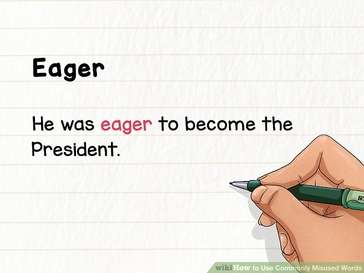Difference Between Anxious and Eager
Key Difference: While both the words describe a state of anticipation, the difference is in the usage of both these words. Both convey different emotions and hence the usage of these words in the sentence enable one to understand the emotion and the context in a better way. The key difference is that anxious is typically followed by a preposition and has a negative connotation with reflection to one's fear, nervousness about something that is to  happen in the future. Whereas, Eager is generally followed by an infinitive with positive outlook to the situation either impatiently or enthusiasm to do something or to happen in the future.
happen in the future. Whereas, Eager is generally followed by an infinitive with positive outlook to the situation either impatiently or enthusiasm to do something or to happen in the future.
Anxious is an adjective describing a state of high nervousness or worry. It is typically used when one is anxious about uncertain future events, or present circumstances which cause discomfort. The word anxious originated in early 17th century from Latin anxius (from angere which to choke) plus ous. Eager is also an adjective describing the state to strongly want to do something or to have something. The word eager originated from Middle English (also in the sense as pungent, sour); from Old French aigre meaning keen, from Latin acer, acr- sharp, pungent.
Anxious is defined as:
-
Full of mental distress or uneasiness because of fear of danger or misfortune; greatly worried;
-
Characterised by worry or nervousness.
-
Very eager or concerned to do something or for something to happen.
While Eager is defined as:
-
Keen or ardent in desire or feeling; impatiently longing.
-
Characterised by or revealing great earnestness.
-
Interested or strongly wanting to do or to have something.
Thus, by the definitions the difference between their meanings is that eager refers to keen interest and enthusiasm whereas anxious or anxiety is charaterised by unease or nervousness.
It is a general belief that anxious and eager words can be interchangeably used as both are adjectives and both deal with expectations for the future, which is incorrect as both the term differ in the usage and thereby the situation reflecting either negative or positive attribute. For example
-
I am eager to go home and meet my family.
-
I am anxious to meet my parents after failing in the exams.
To easily understand the difference in the usage between anxious and eager, just remember eager is used for a positive situation, interest or keen for something as used in the first sentence. Anxious is used with negative connotation denoting nervousness or fear in the situation as seen in the second sentence.
 Anxious is best suited to use when worry and anticipation both are meant together, while eager is much better choice when no sense of uneasiness is attached to the situation. An anxious person will have a bleak outlook and eager person will have a positive outlook with interest or eagerness on the same situation. Both words are synonyms of each other but as we know there is a slight difference in each synonym as per the usage of the words. So, another way to distinguish each words is that anxious is generally followed by a preposition, while eager is followed by the to of an infinitive. So, this means that anxious is being worried, scared or nervous about something, whereas eager is being excited about to do something or to be something. For example: The kids are eager to shift in the house, but the parents are anxious about the price. In this sentence the first says that the children are enthusiast perhaps even impatient to move in the house but the parents are worried whether they will be able to afford it.
Anxious is best suited to use when worry and anticipation both are meant together, while eager is much better choice when no sense of uneasiness is attached to the situation. An anxious person will have a bleak outlook and eager person will have a positive outlook with interest or eagerness on the same situation. Both words are synonyms of each other but as we know there is a slight difference in each synonym as per the usage of the words. So, another way to distinguish each words is that anxious is generally followed by a preposition, while eager is followed by the to of an infinitive. So, this means that anxious is being worried, scared or nervous about something, whereas eager is being excited about to do something or to be something. For example: The kids are eager to shift in the house, but the parents are anxious about the price. In this sentence the first says that the children are enthusiast perhaps even impatient to move in the house but the parents are worried whether they will be able to afford it.
Comparison between Anxious and Eager:
|
Particulars |
Anxious |
Eager |
|
Definition |
Anxious is defined as:
|
While Eager is defined as:
|
|
Attribute |
Negative attribute associated with fear, worry, uneasiness and nervousness. |
It is a positive aspect with association to enthusiasm, interest and desire. |
|
Usage |
Typically used to mean nervousness or distressed while anticipating an upcoming event. |
Used when looking forward to something with excitement or impatiently waiting for something. |
|
Examples |
She was anxious about her future. |
I am eager to start swimming classes. |
|
Synonyms |
Worried, Disturbed, fearful, Uneasy. |
Ambitious, Impatient, Keen, Restless. |
Image Courtesy: Fbcpuxico.com, Wikihow.com









Add new comment